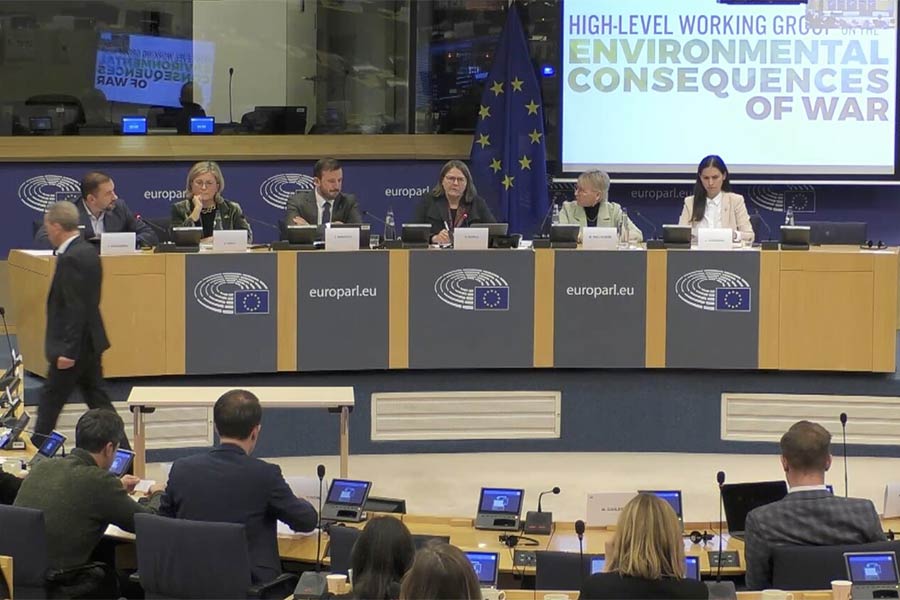On November 27th, Ecoaction’s Board member Anna Ackerman delivered a statement during the European Parliament public hearing of the High-Level Working Group on the Environmental Consequences of the War in Ukraine. We share with you the full text of her statement.
Madam Vice-President,
Honourable Members of Parliament and of the High-Level Working Group,
Thank you for the invitation to this hearing and for all the support the European Union has been providing to the people of Ukraine.
In the end of March 2022, once northern regions of Ukraine were liberated from occupying Russian forces, we started rebuilding. This is when civil society organisations agreed on seven principles of a green reconstruction of Ukraine, and I would like to highlight them for you: (1) Integration of environmental and climate policy into all sectors. (2) Reconstruction that should serve the needs of Ukrainians and promote the sustainable development of the country.
(3) Development of the green economy. (4) Environmental standards at all levels. (5) Adherence to European environmental planning tools for Ukraine’s restoration. (6) The role of local self-government, transparency, and involvement of the public and communities in decision-making. (7) Effective functioning and use of targeted funds for post-war recovery and green economic development.
These principles are even more important today, considering the recommendation by the European Commission to open accession negotiations with Ukraine, and even more after Russia’s massive attacks against our energy infrastructure, destruction of the Kakhovka Dam and all the grave environmental consequences of this war. These principles mean much more for Ukrainians than you may imagine.
In cold March 2022, during the battle for Kyiv region, in absence of electricity in the grid, an owner of a solar PV rooftop installation shared his precious locally produced clean energy with his neighbours. Later he joined the Armed Forced of Ukraine and was killed in Bakhmut. His name was Oleksii Khabatiuk, and he was one of the best climate and energy professionals in the country whose legacy, among other things, is democratisation of our energy sector.
Since the first months and weeks of the full-scale invasion, thanks to impressive efforts by Ukrainian and international NGOs, this war has become one of the best-documented ones in terms of environmental damage analysis. A pioneering work has been done by a non-governmental group of experts on analysing the climate impact of Russia’s war. All this information is necessary to both find ways to hold the aggressor accountable for the damages and having a baseline to rebuild Ukraine back better.
In December 2022, the City of Sumy, which has been regularly shelled by Russia, adopted its municipal energy plan whose goal is to increase energy efficiency in key sectors and reach carbon neutrality in longer term. Meanwhile, the cities of Mykolaiv and Kharkiv started working with international architects and partners on new general plans – not just rebuilding but rethinking the cities.
In June this year, during the Ukraine Recovery Conference in London, civil society coalition RISE Ukraine together with the government presented DREAM ecosystem designed to store information about all the reconstruction projects in one place and promote through this digital platform a transparent, inclusive and sustainable recovery. During the same Conference the Ministry of Energy of Ukraine also confirmed its commitment to phase out coal by 2035, and the goal to decarbonise our country’s energy sector by 2050. The National Energy and Climate Plan of Ukraine meant to reflect ways of achieving these targets, is currently under development, supported by civil society colleagues.
At this very moment representatives of Ukrainian coal mining towns, accompanied by environmental NGO Ecoaction, are discussing here, in Brussels, their just transition away from coal. We have been supporting these communities for years in their aspiration to move away from full dependence of local economy on fossil fuel production to diversification and energy transition. Some of the coal towns are under occupation; others are very close to the frontline. But they are still moving forward because they want to have a future.
Ukrainian communities and civil society are the source of Ukraine’s resilience. For many of them, green reconstruction in the time of the full-scale war is about energy and resource security, saving scarce financial resources, new jobs, environmental safety, inclusivity, and EU integration. But to rebuild better we need the knowledge, capacity, and available finances. According to a recent study, both NGOs and public authorities lack sectoral expertise and human resources to be able to work on implementing EU standards.
Ukrainian civil society and communities don’t want to build back old infrastructure. We want to build a more sustainable future, and transition to a modern green economy together with the EU. Because only a strong and prosperous Ukraine could provide security for its people and Europe.
Thank you for your attention.
For further information please contact:
Anna Ackermann, aa@ecoaction.org.ua

